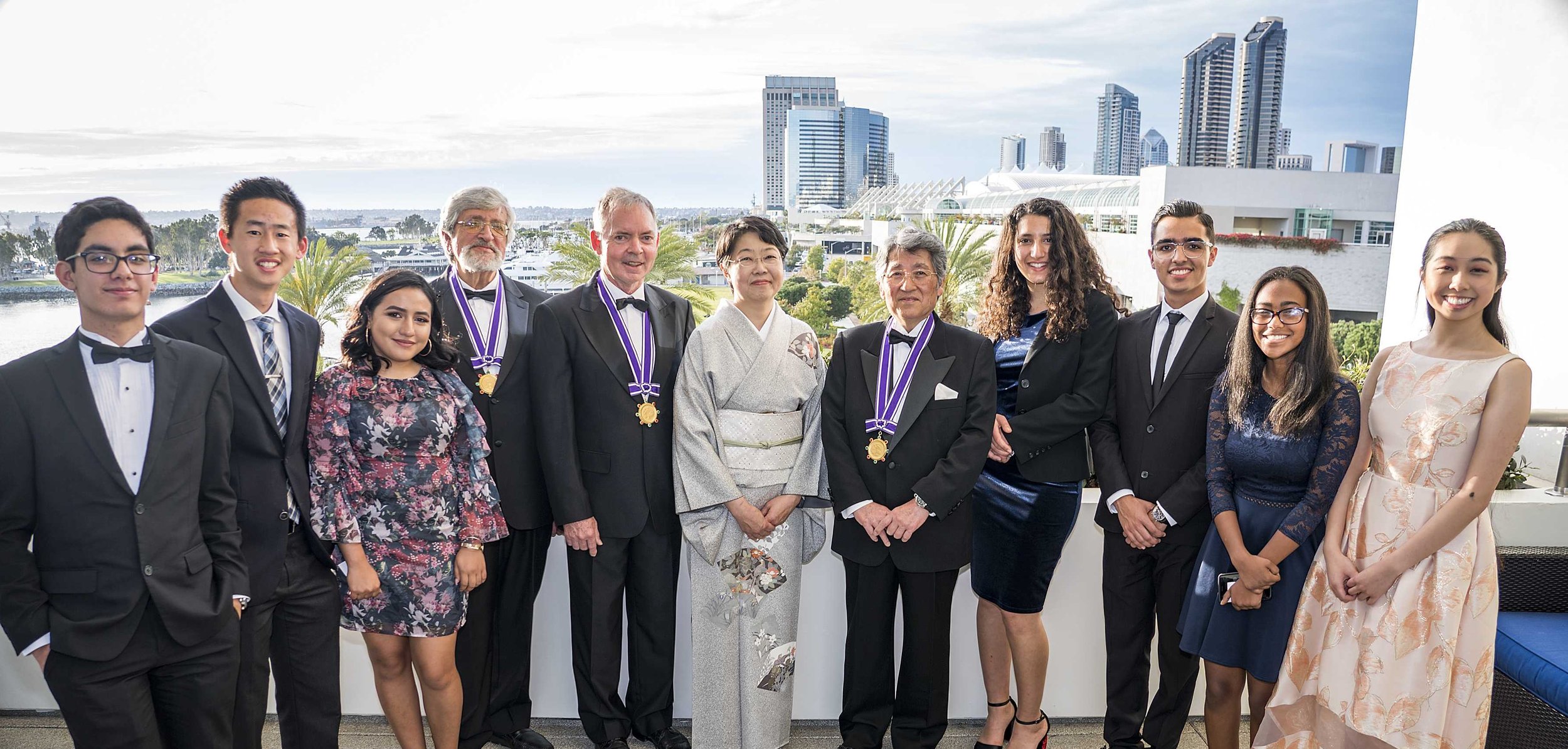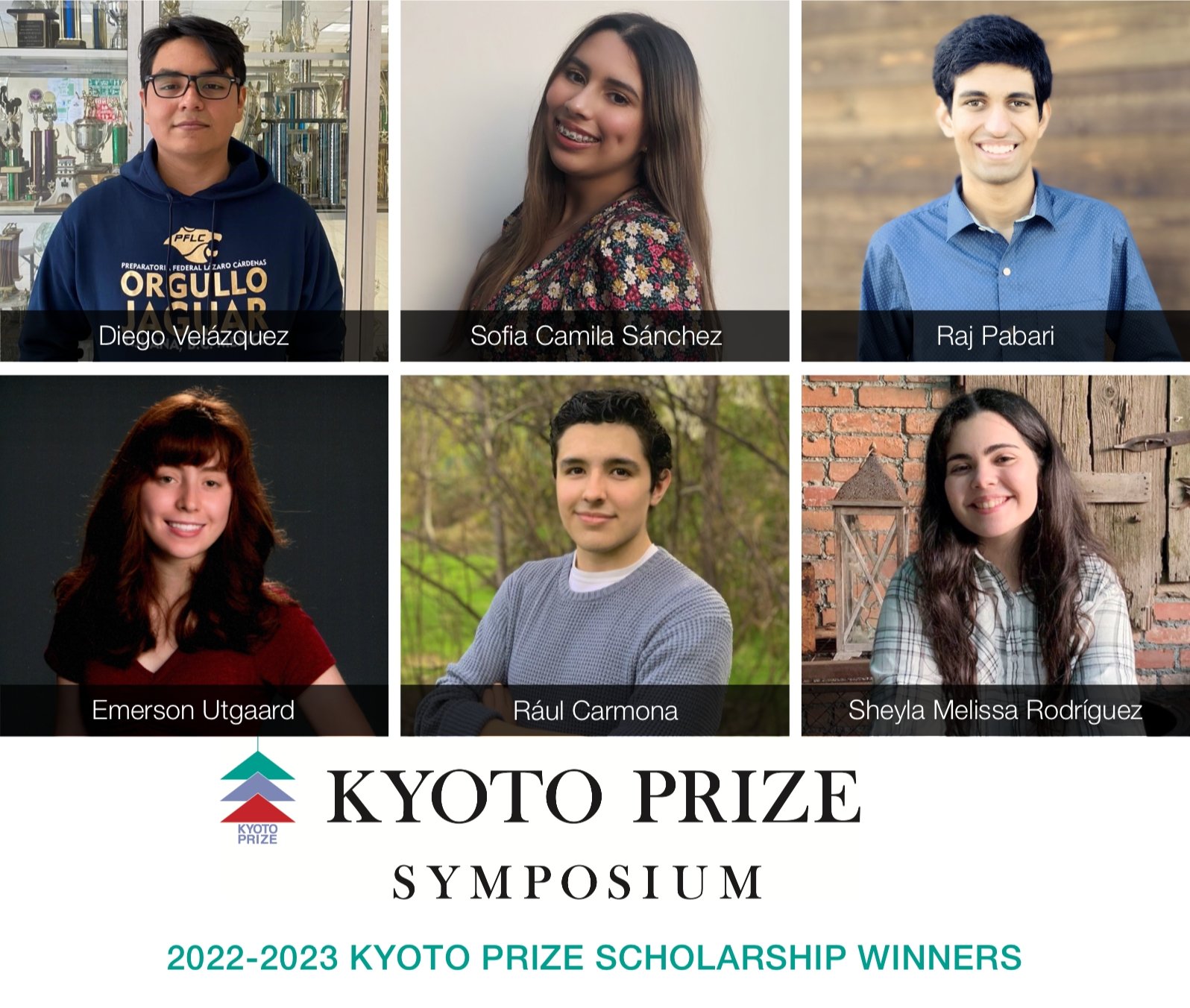
U.S. Application Period: November 4, 2025 - January 6, 2026
Mexico Application Period: October 22, 2025 – December 5, 2025
Since 2004, The Kyoto Symposium Organization (KSO) has offered its scholarships to college-bound students from public and private high schools in both San Diego and Mexico.
In partnership with local universities, KSO has provided nearly $5 million in scholarships to the San Diego and Baja California region.
For U.S. inquiries please contact The San Diego Foundation or Bryan Lusby at KSOBryan@outlook.com.
For Mexico inquiries please contact Fundacion Interncional de la Comunidad or Concha Valladolid at c_valldolid@hotmail.com.
Scholarship recipients presenting at the annual Kyoto Prize Symposium Gala
Scholarship recipients meeting the Kyoto Prize Laureates
“The Kyoto Scholarships create stronger
relationships and understanding between the U.S., Japan and Mexico. By rallying our community around this worthy cause, I believe the Kyoto Prize Symposium will become an enduring
legacy for our region.”
— Malin Burnham, Founding Chair, Kyoto Symposium Organization
Applications are available through the San Diego Foundation (for U.S.) and Fundacion Internacional de la Comunidad (for Mexico). Please visit their websites to apply. As part of the application process, students will write two personal statement essays and one essay on the below prompt.
Please select one of the three 2025 Kyoto Prize Laureates
What inspires you most about his/her life achievements, work and contributions to society?
Advanced Technology
Shun-ichi Amari has conducted pioneering research in artificial neural networks and established the field of information geometry, which studies statistical models using the techniques of differential geometry, thereby proposing many important theories. His contributions to both theory and application, influencing various fields, are of major significance.
Basic Sciences
Azim Surani demonstrated that both paternal and maternal genomes are indispensable for normal mammalian development and subsequently discovered genomic imprinting that confers specific modifications and complementary functions to each genome. Furthermore, he has played a pioneering role in elucidating its underlying mechanisms, thereby making contributions to foundational scientific insights across a broad spectrum of life science fields.
Arts and Philosophy
Carol Gilligan has critiqued conventional psychological theories for narrowing the model of personality development and relegating the “care” perspective—which emphasizes human relationships—to a subordinate, gendered status as a feminine moral perspective. By envisioning an enmeshment of the “ethic of justice” and “ethic of care,” Gilligan has established a new academic foundation to address global issues related to care.
FAQs
-
Students must have a minimum 3.0 GPA on a 4.0 scale and be actively involved in serving their community as demonstrated by their involvement in community, extra-curricular activities, or work experience.
Criteria for awarding the Kyoto Scholarship go beyond academic performance and GPA – through these scholarships, the Kyoto Symposium Organization seeks to recognize students who are actively pursuing the betterment of society.
Kyoto Prize Scholarship applicants should:
• Be graduating seniors at San Diego County public, private, or parochial high schools
• Plan to enroll full-time at an accredited four-year university
• Have a cumulative unweighted GPA of 3.0 or higher on a 4.0 scale
• Be actively involved in serving their community -
-
For the U.S., application deadline is January 6th, 2026.
For Mexico, application deadline is December 5th, 2025.
-
In the U.S. three $10,000 scholarships are awarded with up to 8 additional scholarships given to Finalists and Semi-Finalists ranging from $500 to $1,000.
In Mexico, three students are awarded 100,000 pesos (~$5,000) each for their college education.
-
The Kyoto Scholarships are awarded annually each Spring for college-bound high school seniors. The San Diego Foundation’s common application portal opens in early November.
-
A Kyoto Symposium Organization representative will notify the 9 Finalists by end of January for the interview phase of the application process.
If you have not been selected, the San Diego Foundation will notify you separately.
Interviews take place in early February with final selections made by mid February.
Winners of the $10,000 scholarship will be notified by mid February.
-
For the U.S., 9 Finalists will selected for the interview process. Students will be notified by end of January whether they’ve moved onto this phase.
Interviews are 30 minutes in length and done through Zoom. Students will be asked questions by 3 panelists pertaining to their application, field of study, future goals/endeavors and connection to the current Kyoto Prize Laureate and the Inamori Foundation.
Students will need to provide the following before their interviews. It is strongly suggested that these documents be prepared in advance:
Official/unofficial transcript reflecting all 4 years of high school
At least one letter of recommendation by a teacher, counselor, coach and/or advisor
A high resolution head-shot photo
-
Students wishing to apply for the Kyoto Scholarship will be required to submit an essay on one of the Kyoto Prize Laureates in addition to the Common Application questions.
Common Application Essay Questions:
1) If you have decided on your educational and career goals, describe them and explain how your interest in these goals developed. If you have not yet decided on your educational and career goals, describe some possible goals and explain how you might explore and decide on them. (Maximum words 250)
2) Please answer one of the two essay prompts below.1. Explain how an important personal accomplishment, challenge, or experience has impacted
your life. What did you learn and how will you apply this lesson in the classroom or community?
OR
2. Describe an example of your leadership experience in which you have positively influenced
others, helped resolve disputes, or contributed to group efforts over time. (Maximum words 500)Kyoto Prize Essay Question:
3) Select ONE of the current Kyoto Prize Laureates. Describe what inspires you most about his/her life, achievements, work and contributions to society. (Maximum words 500)
Please Note:All three essay questions are required to complete the Kyoto Scholarship application.
Finalists will be required to provide their most recent unofficial school transcript AND a reference letter (from a teacher, counselor, adviser, or coach) PRIOR to their interview. Students selected for an interview will be notified by the end of January.
-
Global entrepreneur and humanitarian, Dr. Kazuo Inamori created the Kyoto Prize in 1984, an international award presented by the Inamori Foundation each November to recognize individuals and groups worldwide who have made outstanding contributions to the betterment of the global community and humankind. The Foundation’s activities have their spiritual basis in the founder’s lifelong belief that humankind’s future can be assured only when there’s a balance between our scientific development and our spiritual depth.
To learn more visit: https://www.kyotoprize.org/en/.








